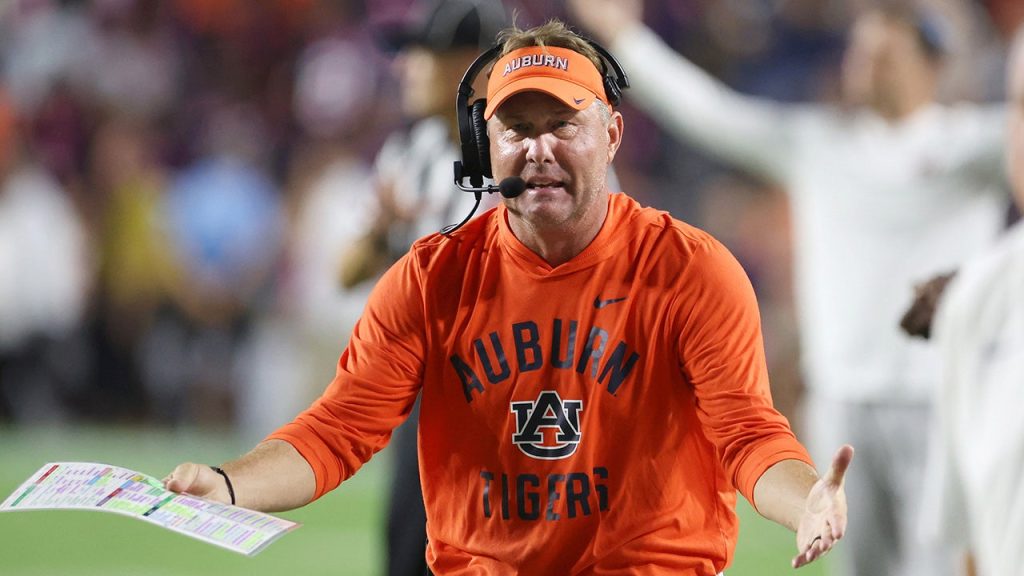Hugh Freeze’s Auburn Departure: A Family’s Perspective
In a significant turn of events for Auburn football, head coach Hugh Freeze has been dismissed following the team’s disappointing 10-3 loss to Kentucky last Saturday. Auburn Athletic Director John Cohen acknowledged Freeze’s contributions in a statement, saying, “Coach Freeze is a man of integrity, and we are appreciative of his investment in Auburn and his relentless work over the last three years in bolstering our roster.” The decision brings to an end Freeze’s relatively brief tenure with the Tigers, where he compiled an overall record of 15-19 across two-plus seasons, including a 6-7 record in his first year and dropping to 4-5 this season before his dismissal.
Behind the scenes, Freeze’s departure reveals a more complicated personal story involving his health struggles. Madi Freeze, the coach’s daughter and an Auburn student, shared her perspective on social media, expressing a mixture of disappointment and relief regarding her father’s dismissal. In a candid TikTok video, she revealed that her father had been diagnosed with early-stage prostate cancer in February, and despite being given clearance to continue coaching during treatment, his health had visibly deteriorated in recent months. “In some twisted way, there’s a relief factor for me personally because I’ve watched my dad’s health just deteriorate over this,” Madi explained, adding that observers could clearly see her father was not well.
The health revelation adds a profound human dimension to Freeze’s departure from Auburn. According to Madi, her father now has scheduled surgeries that had apparently been postponed during the season. “I’m thankful there’s relief that my dad finally gets to have the surgeries that he needs, and they’re scheduled, and he’s going to get healthy,” she stated, suggesting that the pressure of coaching may have complicated his health management. When Freeze’s cancer diagnosis was made public in February, the university had expressed optimism, noting that doctors believed his condition was “very treatable and curable” due to early detection.
Madi Freeze’s comments also hinted at a disconnect between the family’s expectations and their actual experience at Auburn. “We loved Auburn, and the second we got here, everybody was very adamant that if you love Auburn, it will love you back,” she reflected. “Unfortunately, that wasn’t the case for us.” This sentiment suggests the Freeze family felt a lack of reciprocal support from the Auburn community, despite Hugh Freeze’s efforts to rebuild the program after joining from Liberty following the 2022 season. Despite this disappointment, Madi maintained a gracious tone, saying, “We don’t wish bad upon them, but we do hope that they turn to the Lord and find Jesus.”
The timing of Freeze’s dismissal follows Auburn’s struggle to gain momentum this season. After a mediocre first year where the team finished 6-7, expectations were higher for 2024. However, with Auburn sitting at 4-5 after the loss to Kentucky, the administration decided to make a change. Freeze had arrived at Auburn with some fanfare after a successful stint at Liberty, but was unable to translate that success to the highly competitive SEC environment. His overall record of 15-19 represented a disappointment for a program with Auburn’s traditions and aspirations.
This story highlights the often-overlooked human elements of college football coaching transitions. While public discourse typically focuses on win-loss records and on-field performance, Hugh Freeze’s departure from Auburn reveals the personal toll that high-pressure coaching positions can take on health and family. As Freeze steps away from the sidelines, his daughter’s perspective offers a reminder that behind every coaching change are real people facing real challenges beyond the football field. For the Freeze family, this dismissal represents not just a professional setback but potentially an opportunity for Hugh to prioritize his health and well-being after what appears to have been a physically challenging period in his life.


